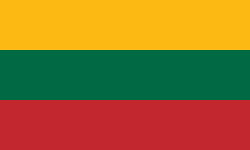| Lithuania at the Olympics | |
|---|---|
 | |
| IOC code | LTU |
| NOC | Lithuanian National Olympic Committee |
| Website | www |
| Medals Ranked 69th |
|
| Summer appearances | |
| Winter appearances | |
| Other related appearances | |
Lithuania, after declaring restoration of independence in 1918, sent its athletes to the 1924 Summer Olympics in Paris for the first time. At first it was considered to send 33 athletes, but then it was decided to limit the delegation to 13 soccer players and 2 cyclists. The soccer players arrived in Paris only a day before the game was scheduled. Lithuania debuted at the Olympic Games on May 25, 1924, at 2:40pm (Paris time) when the match between Lithuanian and Swiss teams started. Lithuania lost 9-0 (4-0). The cyclists could not finish the 188 km race because of technical difficulties.
Contents
- Medal tables
- Medals by Summer Games
- Medals by Winter Games
- Medals by summer sport
- List of medalists
- Summer Olympics
- List of gold medal winners
- Olympic participants
- Summer Olympics 2
- Winter Olympics
- See also
- External links
In 1928 Summer Olympics Lithuania had 12 representatives for 4 sports: 2 boxers, 4 cyclists, and 5 athletics and one weightlifter. Juozas Vinča achieved the best results and took 5-7 place in boxing.
In 1932 Summer Olympics in Los Angeles, Lithuania did not participate due to economic difficulties and political controversies surrounding the National Olympic Committee.[ citation needed ] In 1936 Summer Olympics in Berlin, Lithuania was not invited by Germany due to German territorial claims over Klaipėda region and Trial of Neumann and Sass. In 1940, Lithuania was occupied by the Soviet Union. After the Second World War, Lithuanians participated in the Olympic Games with the Soviet Union team. From 1948 to 1988, 86 Lithuanians participated in the Olympics and won 60 medals (57 in Summer and three in Winter Olympics).
Since the restoration of its independence in 1990, Lithuania has not missed any Olympic Games.
Lithuania has never won a medal at the Winter Olympics.